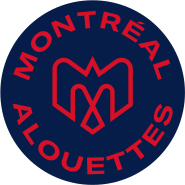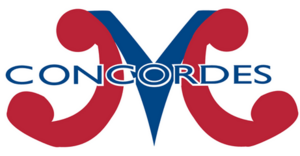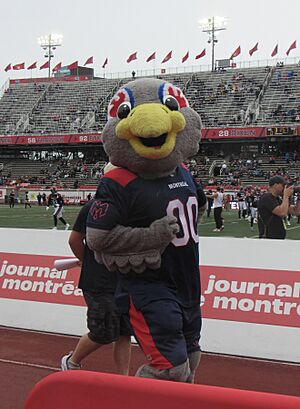Montreal Alouettes facts for kids
| Founded | 1946 |
|---|---|
| Based in | Montreal, Quebec, Canada |
| Home field | Percival Molson Memorial Stadium |
| Head coach | Jason Maas |
| General manager | Danny Maciocia |
| Owner(s) | Pierre Karl Péladeau |
| League | Canadian Football League |
| Division | East |
| Colours | Red, white, blue |
| Nickname(s) | Als, Larks, Les Moineaux |
| Mascot(s) | Touché |
| Grey Cup wins | 8 (1949, 1970, 1974, 1977, 2002, 2009, 2010, 2023) |
| Website | en.montrealalouettes.com montrealalouettes.com |
| Current uniform | |
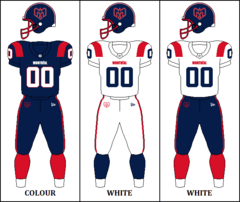 |
|
The Montreal Alouettes (known in French as Les Alouettes de Montréal) are a professional Canadian football team from Montreal, Quebec. People often call them the Als. The team started in 1946. It has stopped playing and then started again twice. The Alouettes play in the East Division of the Canadian Football League (CFL). They last won the Grey Cup in 2023, beating the Winnipeg Blue Bombers in a thrilling game. Their main stadium is Percival Molson Memorial Stadium. Since 2014, they also play their playoff games there.
The first Alouettes team played from 1946 to 1981. They won the Grey Cup four times. They were especially strong in the 1970s, reaching the Grey Cup six times and winning in 1970, 1974, and 1977. After facing difficulties in 1982, the team was restarted as the Montreal Concordes. They played as the Concordes for four years. In 1986, they brought back the Alouettes name. However, the team stopped playing again in 1987. This meant no CFL football in Montreal for nine years.
The Alouettes team we know today started in 1996. Its owner previously owned the Baltimore Stallions. The Stallions were a very successful American team in the CFL. They even won the Grey Cup in 1995. When the Alouettes returned, many players from the Stallions joined them. These players became a strong part of the 1996 Alouettes team.
The CFL sees all Montreal football teams since 1946 as one continuous team. They consider the Alouettes to have paused operations from 1987 to 1996. Even though the team's return in 1996 involved the Baltimore Stallions, the league does not count the Stallions' history as part of the Alouettes' official records.
The Alouettes team from the 2000s was one of the best in the CFL. They played in almost every Grey Cup Final that decade. They won three Grey Cups, bringing their total to seven at that time. From 1996 to 2014, the Alouettes had the longest streak of making the playoffs in the CFL. This impressive run ended in 2015. Famous players from this time include Mike Pringle, who holds the CFL record for rushing yards. Quarterback Anthony Calvillo also set records for career passing yards in professional football.
In 2019, the CFL bought the team from owner Robert Wetenhall. He had been unable to find someone to buy it. Later that year, Sid Spiegel and Gary Stern bought the Alouettes through their company. They took over on January 6, 2020. In February 2023, the league took ownership again. Then, in March, they sold the team to Pierre Karl Péladeau, a well-known Quebec businessman. On November 19, 2023, the Alouettes won their eighth Grey Cup. This was in Péladeau's first season as owner. The team also played in the 2025 Grey Cup, where they lost to the Saskatchewan Roughriders 25–17.
Contents
- Team History
- The First Alouettes: 1946-1981
- The Montreal Concordes: 1982-1985
- Rebranding and Team Closure: 1986-1987
- The Baltimore Stallions: 1994-1995
- The Alouettes Return: 1996-1997
- The Anthony Calvillo Era: 1998-2013
- After Anthony Calvillo: 2014-2018
- New Ownership and Rebranding: 2019-2023
- Pierre Karl Péladeau Ownership: 2023-Present
- Current Roster
- Current Coaching Staff
- Television and Radio
- Players of Note
- Head Coaches
- General Managers
- Mascots
- Season-by-Season Results
- See Also
Team History
The First Alouettes: 1946-1981
Football has been played in Montreal for a very long time, since the 1850s! The Alouettes team officially started in 1946. It was founded by Lew Hayman, Eric Cradock, and Léo Dandurand. They chose the name "Alouettes" after a famous French song. An "alouette" is a type of bird called a skylark. This bird was a symbol for people in Quebec who speak French. The name also honored the "Alouette" Squadron from World War II. This was a French-Canadian air force squadron.
The team quickly found success. They won their first Grey Cup championship in 1949. They beat the Calgary Stampeders 28–15. Key players were quarterback Frank Filchock and running back Virgil Wagner.
The 1950s were a great time for the Als. Quarterback Sam Etcheverry threw amazing passes to receivers like Red O'Quinn and Hal Patterson. Pat Abbruzzi was a strong runner. This made Montreal's offense one of the best in Canadian football. They played in the Grey Cup three years in a row, from 1954 to 1956. However, they lost each time to the Edmonton Elks.
Ted Workman bought the team in 1954. In 1958, the Alouettes joined the new Canadian Football League (CFL). The team was successful until the end of the 1960 season. A big trade happened that sent star players Hal Patterson and Sam Etcheverry away. This trade caused problems because Etcheverry had a contract that prevented him from being traded. He then became a free agent. The trade was changed, and Patterson was traded for another player. This event greatly impacted the team.
This trade was one of the worst in Alouettes history. It led to a tough decade for the team. They did not have a single winning season during this time. From 1968 to 1976, the team played at Autostade. This stadium was built for Expo 67. Its location was not ideal, leading to low attendance. This made it harder for the team financially.
Ted Workman sold the team to Joe Atwell in 1965 and 1967. However, this did not help the team's performance. In 1969, they had a very bad season, winning only two games. After this, Sam Berger bought the team. He was a very skilled owner. Berger made big changes right away. Red O'Quinn and Sam Etcheverry returned as general manager and head coach. The team also got new uniforms and helmets. Many new players joined the team, ready for a fresh start.
The changes worked quickly! In 1970, the Alouettes won the 58th Grey Cup. They beat the Calgary Stampeders 23–10 in Toronto. Quarterback Sonny Wade was named the game's most valuable player. He became a fan favorite, just like his coach, Sam Etcheverry, had been. This was Montreal's first Grey Cup win since 1949.
This 1970 victory started the team's best decade ever. Under Sam Berger's ownership, the team played in six Grey Cups and won three. In 1974, the team changed its colors to red, white, and blue. These were the same colors as other Montreal sports teams. They moved to Olympic Stadium in 1976, and more fans came to games. In 1977, the Als had a fantastic year. They won the Grey Cup in their home stadium. A record 68,318 fans watched the game.
However, this success ended when Berger retired in 1981. He sold the team to Nelson Skalbania. Skalbania signed many famous players. But even with these stars, the Alouettes had a poor season, winning only 3 games. Attendance also dropped. The team still made the playoffs because other teams in their division were also struggling. They lost in the East Semi-Final. This was the last game for the original Alouettes team. Skalbania faced financial problems and returned the team to the league in May 1982.
The Montreal Concordes: 1982-1985
The CFL was ready for the Alouettes' difficulties. Montreal businessman Charles Bronfman stepped in. He created a new team to replace the Alouettes. Bronfman named the new team the "Concordes." This name was inspired by the fast Concorde jet. It also sounded good in both English and French. However, a local aviation company, Bombardier, was not happy. They refused to sponsor a team named after a competitor's aircraft.
The Concordes took over the history and records of the Alouettes from 1946-1981. Bronfman kept most of the Alouettes' coaches and staff. He also released many expensive players to control costs. A players' strike in the NFL that year helped some star players stay in Montreal.
The 1982 Concordes had a tough season, winning only two games. This was the worst record in the team's history. The team included quarterback Luc Tousignant, one of the few Quebec-born quarterbacks to start a CFL game. Running back David Overstreet was also a key player.
The team slowly improved over the next three years. In 1983, they won five games. The East Division was weak, so the Concordes almost made the playoffs. In 1984, they returned to the playoffs. In 1985, they reached the East Final. Their playoff win against Ottawa that year was their only home playoff victory as the Concordes.
However, fan attendance did not improve much. Only one game under Bronfman's ownership attracted more than 30,000 fans. The 1985 East Semifinal had very low attendance, partly due to bad weather. Only 11,372 fans watched what would be their last home game as the Concordes.
Rebranding and Team Closure: 1986-1987
In 1986, the team changed its name back to the "Montreal Alouettes." They hoped to bring back fan interest and honor the team's past. However, this did not work. The team had a poor season, winning only 4 games. They missed the playoffs due to a new "cross-over rule." Financial losses grew, and attendance dropped to very low numbers.
Before the 1987 season, the CFL lost its main television sponsor. This was a big blow for the Alouettes. The team had lost millions of dollars under Bronfman's ownership. He decided he could not keep funding the team. Bronfman chose to focus on his other sports team, the Montreal Expos. He said he would not field a football team for 1987 unless many more season tickets were sold. This did not happen, and no new owners came forward.
The league was also facing difficulties with other teams. Moving the team to another city was not an option at the time. The Alouettes played their two preseason games on the road. But on June 24, 1987, just one day before the regular season began, the team officially closed down. The CFL had to quickly release a new schedule with only eight teams. The Winnipeg Blue Bombers moved to the East Division to balance the league.
A special draft was held for the Alouettes players. Some players who lost their jobs later played in the NFL during a players' strike. During the years the Alouettes were gone, another football league, the World League of American Football, had a team in Montreal called the Montreal Machine.
The Baltimore Stallions: 1994-1995
The Baltimore Stallions were a new team in the CFL in 1994. They were part of the CFL's plan to expand into the United States. The team was very popular in Baltimore. They played in the Grey Cup in both of their seasons. They lost in 1994 but won in 1995. They are the only American team to ever win the Grey Cup.
However, things changed quickly. The NFL's Cleveland Browns announced they would move to Baltimore. This meant the Stallions would have to compete with a big NFL team. The Stallions' owner, Jim Speros, decided to move the team.
CFL Commissioner Larry Smith wanted to bring football back to Montreal. He believed that a successful team like the Grey Cup champion Stallions would be perfect. Speros agreed to move the Stallions to Montreal. This officially ended the CFL's American expansion.
On February 2, 1996, the move was approved. Speros decided to bring back the Alouettes name. He was allowed to reclaim the history of the 1946–1986 Alouettes/Concordes. However, the Stallions' history and records were not transferred to the Alouettes. The CFL officially considers the Alouettes to have paused operations from 1987 to 1995.
Many Stallions players were released from their contracts. But general manager Jim Popp was able to re-sign many of them. The Stallions had not needed many Canadian players. So, a special draft was held to add Canadian players to the new Alouettes team. Popp hired Bob Price as the new head coach. With many former Stallions players, the Alouettes had a winning record in their first year back. They reached the East Final but lost to the Toronto Argonauts.
In 1997, Speros sold the team to Robert Wetenhall. Larry Smith then became the president of the Alouettes. Bob Price left, and Dave Ritchie became the new head coach.
The Alouettes Return: 1996-1997
The new Alouettes team played its first two seasons at Olympic Stadium. But the large stadium often looked empty, and attendance was low. The team's future seemed uncertain. Then, something unexpected happened in November 1997. A U2 concert was scheduled at Olympic Stadium. This conflicted with an unexpected home playoff game for the Alouettes.
The team decided to move the playoff game to Molson Stadium. This was a smaller stadium where they had played before. Fans loved it, and the game sold out! This showed that a smaller, more intimate stadium was better. The team decided to move permanently to Molson Stadium starting in 1998. The stadium could hold 20,202 fans. Before every Sunday home game, the team plays the U2 song "Sunday Bloody Sunday" to remember this event. The Alouettes still used Olympic Stadium for one home game a year and for playoff games until 2012. The team had a strong start, winning 25 games and losing 11 in their first two seasons. They reached the East Division Finals both times.
The Anthony Calvillo Era: 1998-2013
The Alouettes became even better in 1998. They signed a young quarterback named Anthony Calvillo and drafted slotback Ben Cahoon. Veteran players Tracy Ham and Mike Pringle helped the team finish second in their division. They lost a close game in the East Final. In 1999, under new coach Charlie Taaffe, they won their division title for the first time since 1979. But they lost the East Final again in a very close game.
After Tracy Ham retired, Anthony Calvillo became the full-time starting quarterback in 2000. He led the team to their first Grey Cup final since 1979. They lost a close game to the BC Lions. After the season, Charlie Taaffe left. In 2001, the team started strong but struggled after Calvillo got injured. The general manager, Jim Popp, took over as coach for the playoffs, where they lost.
In 2002, the Alouettes hired Don Matthews as head coach. They had the best record in the CFL (13–5). They then won their first Grey Cup since 1977, beating the Edmonton Eskimos 25–16. In 2004, the Alouettes again had the best record (14–4). But Calvillo got hurt in the East Final, and they lost to the Toronto Argonauts. After that season, Mike Pringle signed a one-day contract to retire as an Alouette. In 2005, the team played in the first Grey Cup overtime game in almost 50 years, losing to the Edmonton Eskimos.
In 2006, coach Matthews left due to health reasons. Jim Popp coached the rest of the season, leading the team to the Grey Cup. They lost to the B.C. Lions. Popp continued coaching in 2007. The team had its first losing season since 1996, partly because Calvillo left to be with his sick wife. They lost in the East Semi-Final.
Montreal hosted the 2008 Grey Cup. The Alouettes wanted to play in it. They hired experienced NFL assistant coach Marc Trestman. He helped them achieve an 11–7 record and reach the Grey Cup. They lost to the Calgary Stampeders 22–14 in front of over 66,000 fans.
The 2009 season was amazing for the Alouettes. They set a team record with 15 wins. Their defense was also one of the best in CFL history. Marc Trestman won coach of the year. The Alouettes won the 2009 Grey Cup with a thrilling 28–27 comeback victory. They were down 27–11 with only 8 minutes left! Kicker Damon Duval missed a field goal on the last play. But the Saskatchewan Roughriders had too many players on the field, giving Duval a second chance. He made the kick, giving Montreal an incredible Grey Cup win. This game became a Grey Cup classic.
The 2010 season was also great. Montreal went 12–6 and became the first team since 1997 to win back-to-back Grey Cups. They played the Saskatchewan Roughriders again. After being down at halftime, the Alouettes scored 13 unanswered points. They held on to win the Championship 21–18.
The 2011 season was another record-breaking year for Anthony Calvillo. He broke many CFL records, including all-time touchdown passes and career passing yards. NFL legends like Warren Moon and Dan Marino congratulated him. Despite Calvillo's success, the Alouettes lost in the East Semi-Final due to many injuries.
The 2012 season was good, with an 11–7 record. However, they lost the East Division Final to the Toronto Argonauts in a close game.
Before the 2013 season, coach Marc Trestman left for the NFL. Dan Hawkins was hired but was fired after a 2–3 start. Jim Popp coached the rest of the year. Calvillo suffered a season-ending concussion. Other quarterbacks like Troy Smith played for the team. The Alouettes finished 8–10 and made the playoffs for the 18th year in a row. They lost the East Semi-Final. Anthony Calvillo retired on January 21, 2014, after a 20-year career.
After Anthony Calvillo: 2014-2018
On February 24, 2014, Tom Higgins became the Alouettes' new head coach. The team finished with a .500 record and made the playoffs. They beat the BC Lions in the East Semi-final but then lost to the Tiger-Cats.
On May 22, 2015, Michael Sam signed with the Alouettes. He became the first openly gay player in CFL history. However, he left after one game. The 2015 season was tough due to injuries to starting quarterback Jonathan Crompton. The team used five different quarterbacks. They finished with a 6–12 record and missed the playoffs for the first time since 1996.
On September 19, 2016, Jim Popp was removed as coach but stayed as general manager. Jacques Chapdelaine became the interim head coach. He was the first Quebec-born head coach in Alouettes history. He became the permanent coach in December. Kavis Reed became the new general manager. The 2016 season was another losing year. After a poor start in 2017, Chapdelaine was fired. The Alouettes finished with their worst record since returning to Montreal, 3–15.
In December 2017, former Green Bay Packers coach Mike Sherman became the new head coach. Under Sherman, the team had its fourth losing season in a row. In the five seasons after Anthony Calvillo retired, the team won 30 games and lost 60.
New Ownership and Rebranding: 2019-2023
On February 1, 2019, the team showed off a new logo and updated uniforms. The new logo was a stylish "M" that looked like a bird and a plane. They also introduced a new slogan, "MontreALS." The team worked with Vice Media for marketing.
On May 31, 2019, owner Robert Wetenhall gave up ownership of the Alouettes to the league. He had tried to sell the team but couldn't find a buyer. The CFL operated the team while looking for a new owner. Several people were interested in buying the team.
On June 8, just before the 2019 season started, Khari Jones took over as interim head coach. Jones led the Alouettes to a 10–8 record. This earned them their first playoff spot since 2014. Quarterback Vernon Adams also played very well. Although they lost in the East Semi-Final, Khari Jones was made the permanent head coach.
On January 6, 2020, the Alouettes found new owners: Sid Spiegel and his son-in-law Gary Stern. Spiegel passed away on July 28, 2021. The 2020 season was canceled due to the COVID-19 pandemic, so he never saw his team play. In August 2022, Gary Stern stepped away from the team's daily operations.
Pierre Karl Péladeau Ownership: 2023-Present
On February 14, 2023, the CFL took ownership of the Alouettes again. Mario Cecchini was named interim President. On March 10, 2023, the CFL announced that Pierre Karl Péladeau had bought the team. On March 28, 2023, Péladeau hired Mark Weightman as the team's president and CEO.
The 2023 season was a big success! The Alouettes went 11–7. They finished second in the East Division. Then, they surprised many by beating the favored Toronto Argonauts 38-17 in the East Division Final. They continued their amazing run by winning the Grey Cup 28–24 against the heavily favored Winnipeg Blue Bombers. The team also played in the 2025 Grey Cup, where they lost to the Saskatchewan Roughriders 25–17.
Current Roster
Quarterbacks
Receivers
Running Backs
Fullbacks
|
Offensive Linemen
Defensive Linemen
|
Linebackers
Defensive Backs
Special Teams
|
1-Game Injured List
6-Game Injured List
|
Practice Roster
Suspended
|
|||||||
| Italics indicate American player • Bold indicates Global player • 46 Roster, 13 Injured, 7 Practice, 8 Suspended Roster updated 2022-11-12 • Depth chart • Transactions • More CFL rosters |
|||||||||||
Current Coaching Staff
Front Office
Head Coach
Offensive Coaches
|
Defensive Coaches
Special Teams Coaches
Staff
→ Coaching Staff |
|||||
Television and Radio
You can listen to Alouettes games in English on Bell Media's CKGM. For French listeners, Cogeco's CHMP-FM is the main station.
Games are also available on Sirius XM Canada. Their French channels are Influence Franco (XM 174) and Attitude Franco (Sirius 164).
The main television coverage for the Alouettes is on TSN and its French partner network, RDS.
Players of Note
Retired Numbers
| Montreal Alouettes retired numbers | ||||
| No. | Player | Position | Tenure | Championships |
|---|---|---|---|---|
| 13 | Anthony Calvillo | QB | 1998–2013 | 2002, 2009, 2010 |
| 27 | Mike Pringle | RB | 1996–2002 | 2002 |
| 28 | George Dixon | RB | 1959–1965 | – |
| 56 | Herb Trawick | G/T/DL | 1946–1957 | 1949 |
| 63 | Pierre Desjardins | G/T | 1966–1971 | 1970 |
| 74 | Peter Dalla Riva | TE/SB | 1968–1981 | 1970, 1974, 1977 |
| 75 | Hal Patterson | WR/DB | 1954–1960 | – |
| 77 | Junior Ah You | DE | 1972–1981 | 1974, 1977 |
| 78 | Virgil Wagner | HB | 1946–1954 | 1949 |
| 86 | Ben Cahoon | SB | 1998–2010 | 2002, 2009, 2010 |
| 92 | Sam Etcheverry | QB | 1952–1960 | – |
Canadian Football Hall of Fame
| Montreal Alouettes Canadian Football Hall of Famers | |||||||||
|---|---|---|---|---|---|---|---|---|---|
| No. | Name | Position | Tenure | Class | No. | Name | Position | Tenure | Class |
| 92 | Sam Etcheverry | QB | 1952–1960 | 1969 | 8 | Tracy Ham | QB | 1996–1999 | 2010 |
| 75 | Hal Patterson | WR/DB | 1954–1960 | 1971 | 57 | Elfrid Payton | DE | 1996–1999 | 2010 |
| 28 | George Dixon | RB | 1959–1965 | 1974 | – | Don Matthews | Head coach | 2002–2006 | 2011 |
| – | Lew Hayman | Head coach/General manager | 1946–1954 | 1975 | 65 | Miles Gorrell | OL | 1982–1985 | 2011 |
| 56 | Herb Trawick | G/T/DL | 1946–1957 | 1975 | 39 | Wally Buono | LB | 1973–1982 | 2014 |
| 78 | Virgil Wagner | HB | 1946–1954 | 1980 | 86 | Ben Cahoon | SB | 1998–2010 | 2014 |
| 36 | Red O'Quinn | End | 1952–1959 | 1981 | 53 | Uzooma Okeke | T | 1997–2006 | 2014 |
| 50 | Tony Pajaczkowski | G/DE | 1966–1967 | 1988 | – | Bob Wetenhall | Owner | 1997–2018 | 2014 |
| 72 | Marv Luster | DB/WR | 1961–1964, 1973–1974 |
1990 | 13 | Anthony Calvillo | QB | 1998–2013 | 2017 |
| 77 | Junior Ah You | DE | 1972–1981 | 1993 | 48 | Tom Hugo | C/LB | 1953–1959 | 2018 |
| – | Sam Berger | Owner | 1969–1981 | 1993 | 31 | Barron Miles | DB | 1998–2004 | 2018 |
| 74 | Peter Dalla Riva | TE/SB | 1968–1981 | 1993 | 57 | Scott Flory | OL | 1999–2013 | 2018 |
| 22 | Gene Gaines | DB | 1961, 1970–1976 |
1994 | – | Marv Levy | Head coach | 1973–1977 | 2021 |
| 65 | Bruce Coulter | QB/DB | 1948–1957 | 1997 | 8 | Nik Lewis | SB | 2015–2017 | 2021 |
| 25 | Terry Evanshen | WR | 1965, 1970–1973 |
1997 | 11 | Chip Cox | DB | 2006–2018 | 2022 |
| 18 | Dickie Harris | DB | 1972–1980 | 1999 | – | Dave Ritchie | Head coach | 1997–1998 | 2022 |
| – | Cal Murphy | Offensive coordinator | 1977 | 2004 | 7 | John Bowman | DE | 2006–2020 | 2023 |
| 67 | Dan Yochum | T | 1972–1980 | 2004 | 59 | Josh Bourke | OL | 2007–2015 | 2023 |
| 65 | Ed George | T | 1970–1974 | 2005 | 66 | Lloyd Fairbanks | OL | 1983–1986 | 2023 |
| 59 | Pierre Vercheval | G | 1998–2001 | 2007 | – | Jacques Dussault | Assistant coach | 1982–1986, 1997–1999 |
2023 |
| 27 | Mike Pringle | RB | 1996–2002 | 2008 | – | Larry Smith | President | 1997–2001, 2004–2010 |
2023 |
| 64 | Glen Weir | DT | 1972–1984 | 2009 | 19 | S. J. Green | SB | 2007–2016 | 2024 |
| 4 | Chad Owens | SB/KR | 2009 | 2024 | |||||
Head Coaches
- Lew Hayman (1946–1951)
- Peahead Walker (1952–1959)
- Perry Moss (1960–1962)
- Jim Trimble (1963–1965)
- Darrell Mudra (1966)
- Kay Dalton (1967–1969)
- Sam Etcheverry (1970–1972)
- Marv Levy (1973–1977)
- Joe Scannella (1978–1981)
- Jim Eddy (1981)
- Joe Galat (1982–1985)
- Gary Durchik (1985–1986)
- Joe Faragalli (1987 – was named head coach but the Alouettes folded before their 1987 regular season started)
- Bob Price (1996)
- Dave Ritchie (1997–1998)
- Charlie Taaffe (1999–2000)
- Rod Rust (2001)
- Jim Popp (2001, 2006–2007, 2013, 2015–2016)
- Don Matthews (2002–2006)
- Marc Trestman (2008–2012)
- Dan Hawkins (2013)
- Tom Higgins (2014–2015)
- Jacques Chapdelaine (2016–2017)
- Kavis Reed (2017)
- Mike Sherman (2018)
- Khari Jones (2019–2022)
- Danny Maciocia (2022)
- Jason Maas (2023–present)
General Managers
- Lew Hayman (1946–1954)
- Vic Obeck (1955–1956)
- Gorman Kennedy (1957–1959)
- Perry Moss (1960–1962)
- Jim Trimble (1963–1964)
- Ted Workman (1965–1967)
- Tony Golab (1968–1969)
- Red O'Quinn (1970–1971)
- J. I. Albrecht (1972–1973)
- Bob Geary (1974–1981)
- Sam Etcheverry (1982–1983)
- Joe Galat (1983–1986)
- Norm Kimball (1986)
- Jim Popp (1996–2016)
- Kavis Reed (2016–2019)
- Danny Maciocia (2020–present)
Mascots
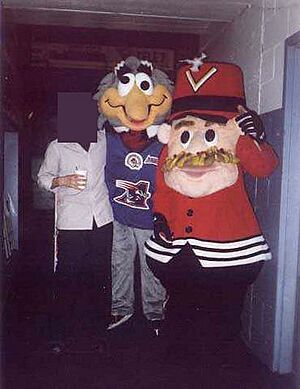
"Alouettes" is French for "Lark." Touché is the official mascot for the Montreal Alouettes. The team also had a second mascot named Blitz, who was introduced in 1999 but retired at the start of the 2013 season.
Season-by-Season Results
See Also
 In Spanish: Montreal Alouettes para niños
In Spanish: Montreal Alouettes para niños
- Montreal Alouettes all time records and statistics
- Canadian Football Hall of Fame
- Montreal Machine
 | Frances Mary Albrier |
 | Whitney Young |
 | Muhammad Ali |


